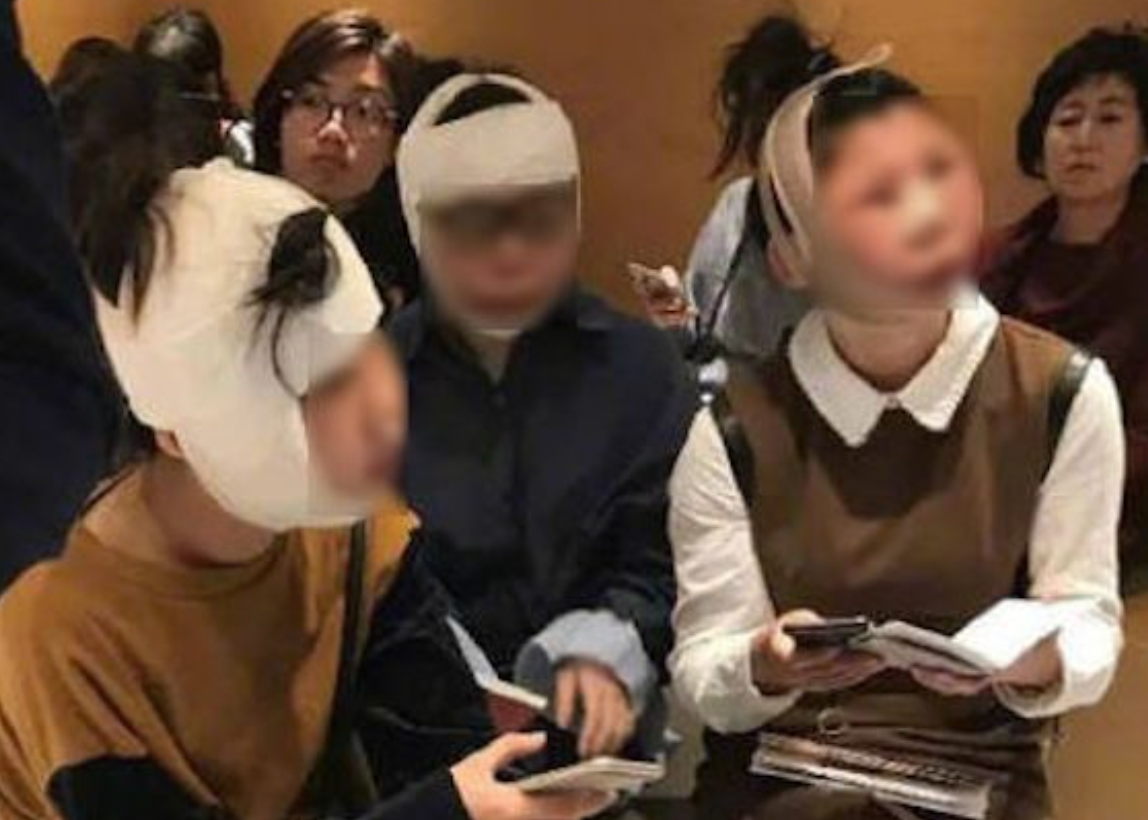|
Update Oct. 17.
According to Asia Today, the newspaper which first covered the “three Chinese women” in China after their story was widely covered by many domestic and international media, the place where the women with their faces wrapped up in bandages and extremely swollen were taken, was found to be on the first floor of the Shilla Duty Free Shop in Seoul, not the airport in Korea.
Also, the part in the article “due to facial swelling caused by the surgical procedure, they were barred from taking their flight back home, and detained and questioned on Oct. 8. This is because their post-plastic-surgery faces were unrecognizable from their passport photos” was not true. An authority from the airport said that “there was no such happening at the airport,” adding that since 2012, fingerprint system is in effect for screening for foreigners.
We regret the errors.
Over the long public holiday last week, three Chinese women, who appear to be in their 20s, flew to South Korea to go under the knife.
However, due to facial swelling caused by the surgical procedure, they were barred from taking their flight back home, and detained and questioned on Oct. 8. This is because their post-plastic-surgery faces were unrecognizable from their passport photos.
The authorities checked their flight tickets and travel documents but they were still unable to prove that the three women were the same people in their passport photos.
On the same day, Jian Huahua, a Chinese TV anchor, posted a photo of the three young Chinese women sitting at the airport with their faces wrapped up in bandages and extremely swollen on her Weibo account. She joked that even their mothers wouldn't recognize them. The image of the three pals spread like the wildfire on Monday. It was liked more than 51,000 times and shared more than 23,000 times.
This problem the women faced at the airport is neither new nor unpredictable in Korea as it is the country with the most aesthetic and cosmetic procedures performed per capita—over 2.2 percent a year (in the United States, it’s about 1.3 percent), according to the International Society of Aesthetic Plastic Surgery.
Increasingly, people from China or Japan visit South Korea to get plastic surgery. The number of Chinese people who flew to Korea for the plastic surgery stood at 27,646 in 2016 which takes up about a whopping 58 percent of a total of overseas visitors, followed by Japan (5.7%), the U.S (5.0%), Thailand (4.8%), Russia (2.9%), Singapore (2.7%) and Vietnam (2.2%), according to the data released by the Ministry of Health and Welfare.
About a third of the more than one million procedures performed in Korea each year is done on “surgery tourists.”
As Korea has a booming and inexpensive plastic-surgery industry, some Korean hospitals have started to issue what’s called a "plastic surgery certificate" so that overseas patients can pass identity checks at the border.
The travel packages for “surgery tourists” that include cosmetic surgery followed by healing trips are becoming popular in Korea including Jeju island.
The increase in Chinese medical tourism is thought to be the result of a lack of trust with the Chinese medical system and the cutting edge technology used in plastic surgery procedures in Korea.
While costly operations like breast implants are popular among rich housewives, for the Chinese patients, simple procedures such as the double eyelid and nose enhancement are the most popular.
And, while the Japanese patients prefer minor changes, the Chinese want rather clean-cut and highlighted features. Also, unlike the Japanese who try one surgery at a time, Chinese patients often prefer multiple surgeries in just one visit.
Below are the responses and comments which were made on social media by.
“To be fair, the Korean immigration officers deem almost everyone as unrecognizable. They ask me “Are you really Korean” all the time whenever I go to Korea.
“Why not fingerprint visitors as they enter the country, like in the US?”
“Superficial Asian problems. Sorry for insensitive comment but chances are they didn’t all have some sort of car accident or the like. Probably just wanted to get matching double eyelids, nose jobs, and smaller faces.”
“Let them travel cargo”
“How can they travel all swelled like that? Aren’t you supposed to wait and rest at least a week or so?”
“I recently came back to Korea after my Chuseok break and they pulled me aside because my passport is new. They wanted to see the old one. I didn’t have it with me, so I had to wait like 20 mins for them to figure things out. The lady was determined not to let me in again. “
|




















